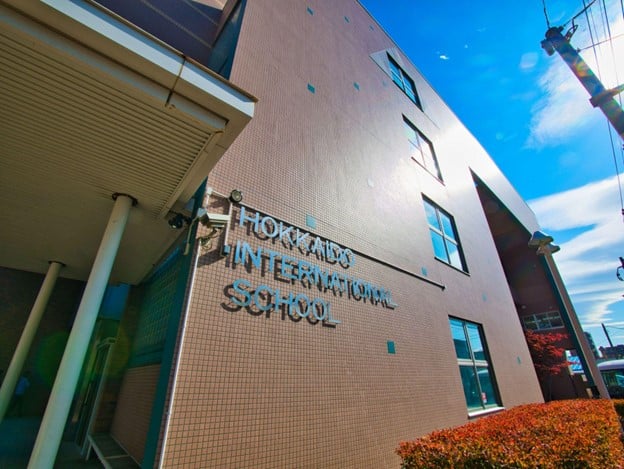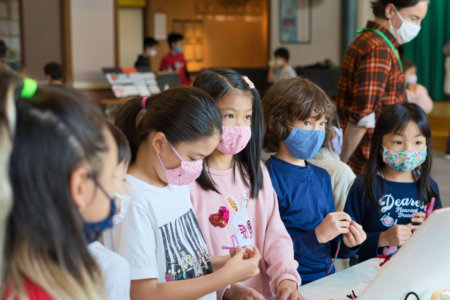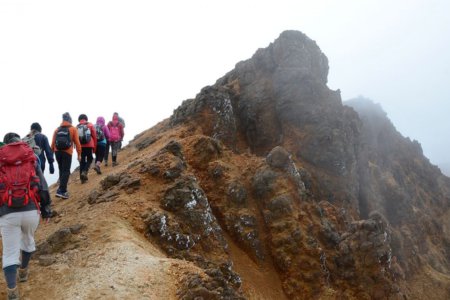After close to two years of lockdown, Japan’s reopening of borders was a celebratory moment for all. For Hokkaido International School (HIS), this meant the opportunity to welcome students back to its campus — making for the start of an exciting year ahead.
Located in Sapporo — the capital of Hokkaido, the northernmost island of Japan — HIS offers an American-inspired educational experience that truly sets itself apart.
Its academic curriculum is rigorous in nature. High school students pursue AP offerings, including seminar and research courses. This requires them to have the focus, determination and grit to perform the best they can — including becoming one of 306 people in the world to receive a perfect score in AP Research.
At HIS, students live and learn on a natural wonderland of a campus, complete with snowy mountaintops, stunning lakes, and lush forest trails. It’s the perfect environment to build character, grow a healthy mind, and make lifelong friendships.
A close-knit, supportive and family-like community is at the heart of this — reflected by HIS’s small student population of 190. Its secondary school is home to approximately 90 students — a great space to get to know peers from all over the world. The coeducational day and boarding school, being the only fully-accredited international school on the island, attracts students of 30 nationalities to its grounds.
Up to forty of these students live on campus — taking full advantage of the many activities offered to them. Life after classes at HIS is filled with unique opportunities. Perhaps you’d like to sharpen your leadership skills by joining the Student Council. Or maybe you’re inclined towards music and want to show off your talent during the school’s annual concert.

HIS invites students from all over the world to a modern campus. Source: Hokkaido International School
Arguably the greatest part of being a student at HIS, however, is its outdoor programme. Here, students learn life skills that sharpen their ability to adapt and thrive in natural environments. They begin their adventurous pursuits from Grades 9 and 10, venturing on numerous outdoor trips and projects. This is taken to a higher level in Grades 11 and 12, where they go on hiking trips, learn to climb Hokkaido’s coastal cliffs and study communication and human nature in their classrooms.
The programme is divided into several pathways depending on grade level. Younger secondary students take Outdoor Pursuits. “This class was just all about being involved and being immersed in nature — we would go outside for as many times as possible, whatever the weather or season was,” shares Ray, a student at HIS. “The four seasons of Hokkaido were greatly utilised in the outdoor education programmes.”
“[In] both Outdoor Education classes, students are involved in lots of collaborative projects (for example, camp cookoff, kayak construction) and informative presentations, such as trip planning, wildlife stewardship,” says programme coordinator Dave Piazza. “Both in the Outdoor Leadership class and Outdoor Pursuits class, students learn about and practice first aid.”
Older students are treated to a more challenging outdoor curriculum. It’s a form of experiential learning that takes place both on campus and around Hokkaido, complete with an overnight hiking trip, snowshoeing to a mountain hut, and an all-day outdoor rock climbing excursion.
Ski days and camping trips around Hokkaido are commonplace for Grade 11 and 12 students. Sari, a student council member and part of the graduating class of 22, participated in a few such trips in Jozankei, Takino and Dominnomori. “My favourite trip was the Jozankei trip because we got the chance to cook and prepare our own meals with my friends in the snow,” she says.
One of the most valuable aspects of such a programme is the ability to learn on the ground. “[Mr. Piazza] would also always make sure that we would learn something new, whether it be about a peculiar plant we spotted or more important aspects such as emergency preparedness,” Ray explains. “I have been mesmerised by the beauty and grandeur of nature on any trip that Mr. P, as we call him, has shown me, whether it be snowshoeing in a local part or climbing 1,800 metres above sea level on Mount Yōtei.”
Piazza says the outdoor programme has achieved its main goal — that is, to provide multi-dimensional benefits to students. “The main transferable skills are leadership skills, especially for Grade 11 and Grade 12 students coming out of the Outdoor Leadership class,” he says.
Apart from providing an alternate way of learning, though, the outdoor programme serves as an outlet for students to let go and simply enjoy themselves. “They love it when we bring them into Hokkaido’s natural world and challenge their limits,” shares Piazza. “Students also appreciate that many of the Outdoor Education classes use the outdoor environment as the classroom for a refreshing change of pace.”
Perhaps the most impactful aspect of such a boarding life, however, is the lifelong friendships made. “Over my four years at this school, each member of our class was able to create lasting and impactful memories with each other that will forever be a part of our life and story,” shares Tadashi, a Class of 2020 graduate. “From freshman trips to the traditional Japanese city of Kyoto, to graduating together in a unique but memorable ceremony, we were able to form a bond that will last a lifetime.”
Follow Hokkaido International School on Facebook, YouTube, Twitter, Instagram













